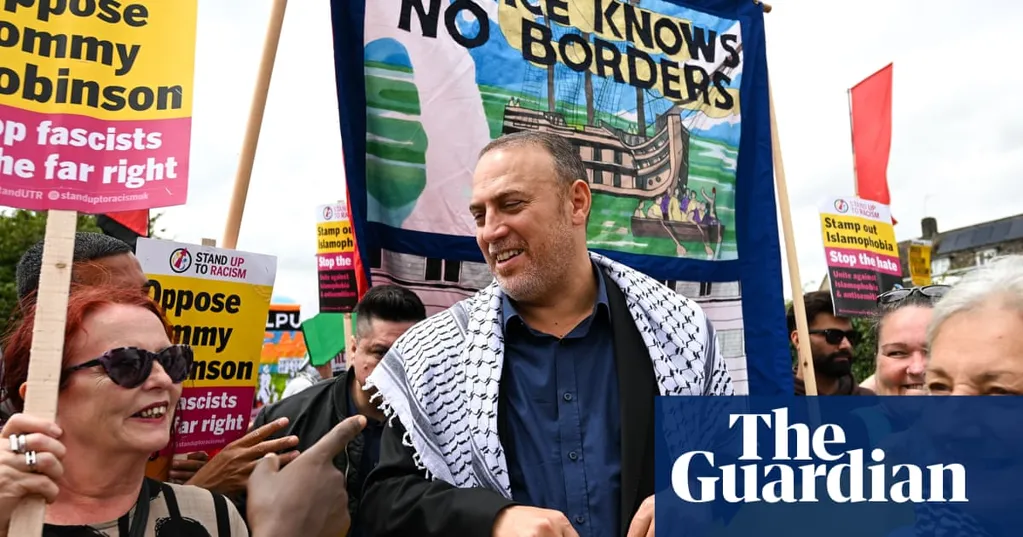I urge the UK to seize this moment - and join the world majority in recognising a Palestinian state
Making recognition of a Palestinian state subject to ever more conditions will only reinforce a "deadly status quo" and will be seen as siding with an apartheid regime, the Palestinian ambassador to the UK has said.
Writing in the Guardian, Husam Zomlot made an impassioned plea to the Labour government to fulfil a manifesto commitment by recognising Palestine in the run-up to a high-level UN conference on the two-state solution in New York next week.
Zomlot wrote: "Recognition is neither a reward for one party nor a punishment for another. It is a long-overdue affirmation of the Palestinian people's unconditional right to exist and live freely in our homeland."
Discussions behind the scenes between western powers are going down to the wire before the conference starting on 17 June, while the US is warning that the conference is counterproductive and should be boycotted. At issue is whether a group of countries that have not yet recognised Palestine do so around the conference or instead say recognition is being offered but on a credible timeline and subject to conditions. France and the UK are conferring intensely.
With the tide of Labour backbenchers behind him, Zumlot argued recognition was not purely symbolic, but an irreversible first step. He added: "Neither should recognition be subject to ever more conditions on the Palestinian side. Delaying recognition simply reinforces the deadly status quo, denying Palestinians' equal rights until Israel consents, thus granting our occupier a permanent veto over the future."
Urging the UK to show moral clarity and leadership, he added: "Peace is not made between occupier and occupied. It can only exist between equals."
France, the co-sponsor of the conference, this week published a letter from the president of the Palestinian Authority, Mahmoud Abbas, in which he stated support for Hamas "laying down its weapons" and "no longer ruling Gaza" as part of a future Palestinian state. The PA in the four-page letter also gave unprecedented commitments to reform and to holding long-delayed internationally overseen presidential elections within a year.
The French presidency said Abbas had promised that "Hamas will no longer rule Gaza and must hand over its weapons and military capabilities to the Palestinian security forces which will oversee their removal outside the occupied Palestinian territory with Arab and international support". Hamas would also have to forswear violence and accept a two-state solution.
In the letter, the PA also condemned the Hamas attack of 7 October 2023, supported a stabilisation mission including Arab and international forces to assist PA security forces and demanded the release of all hostages.
The French president, Emmanuel Macron, described the letter as one of hope.
A senior Gulf diplomat said Hamas had agreed it would not seek to continue to rule Gaza, but no agreement exists on the group's disarmament, including the body to which it would disarm and whether its depleted leadership would be required to go into exile. He added the definition of a Hamas member was difficult.
Hugh Lovatt from the European Council on Foreign Relations said: "Recognition would certainly allow London and Paris to press the PA towards political renewal, including the holding of long-overdue elections, but it does not provide them with much leverage over Hamas which does not consider recognition by itself as being of sufficient value of itself to disarm before a peace agreement with Israel is reached."
One Gulf diplomat said: "Israel is seeking the total annihilation of Hamas and will not be willing to hand security in Gaza to the PA or a multinational force."
In the UK, the Middle East minister, Hamish Falconer, came under unprecedented pressure from MPs of all parties in the Commons on Tuesday to recognise Palestine without conditions in advance of the UN conference. He indicated that the UK was involved in intense international diplomacy to find an agreed position among those states that had yet to recognise Palestine. He said he would make a Commons statement next week.
Falconer in private conversations appeared sympathetic to recognition now, MPs said, but the decision rests with the prime minister, Keir Starmer.
The three countries inside the G7 group of western countries most likely to recognise Palestine are France, Canada and the UK. The G7's annual summit starts on Sunday in Canada.
The conference in New York is not formally about recognition, but the steps necessary to achieve a two-state solution, something Israel used to support, but no longer does. Recognition of a Palestinian state is one way of keeping the pathway alive, it is argued.
Diplomats said the diverse constellation of countries preparing the conference agenda was significant, with Qatar, Mexico and Brazil, for instance, chairing a working party on peace narratives that will try to address the levels of hate generated by the conflict on both sides.
Some diplomats argue that Europe's fear of a backlash from Donald Trump's US over recognition is diminishing since the two sides are drifting so far apart on Israel that the hope of one influencing the other no longer acts as a glue. The new US ambassador to Israel, Mike Huckabee, has said he does not think a two-state solution, one of the objectives of recognition, is itself any longer desirable.
